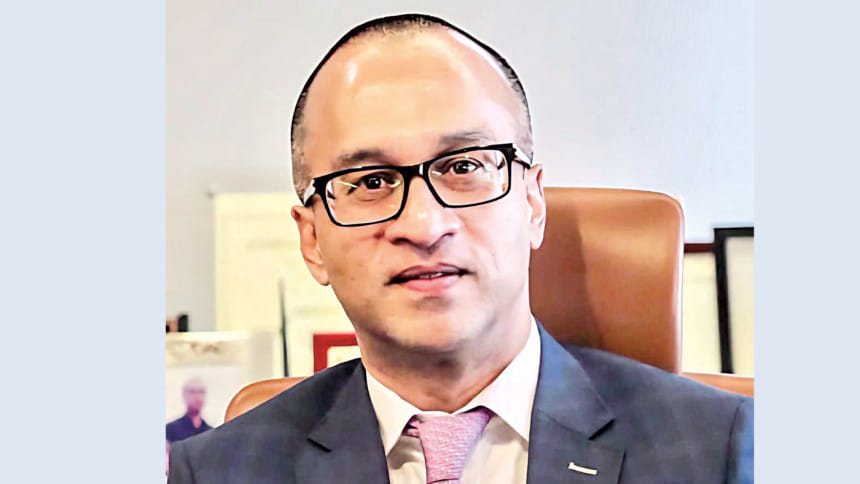Trust, technology, and brand equity – The three pillars of our success

Mashrur Arefin, Managing Director & CEO, City Bank
The Daily Star (TDS): What is the current state and trend of bank deposits in the country?
Mashrur Arefin (MA): The deposit landscape in Bangladesh today is undergoing a profound transition. I would call it a quiet rebalancing of public sentiment.
As of March 2025, total deposits in the banking sector stood at approximately BDT 18 trillion, growing at around 9% year-on-year. This signals a subtle erosion in the real value of bank deposits. What we are witnessing is not a crisis of liquidity, but a crisis of confidence.
Recent stresses in isolated parts of the sector have prompted many to differentiate banks not just by products, but by asset quality, discipline, disclosure standards, and commitment to digital resilience. As a result, depositors are moving towards banks that they perceive as stable, well-governed, and forward-looking.
This is where City Bank's strategy has found its resonance. In the first half of 2025, we registered BDT 8,000 crore growth in deposits—a remarkable acceleration compared to our BDT 3,000 crore growth in the same period of 2024. This momentum is not accidental. It is the result of three deliberate strategic pillars: trust, technology, and brand equity.
TDS: What major deposit schemes does your bank currently offer, particularly those tailored to specific customer segments?
MA: We have built a portfolio that is broad in scope, deep in relevance, and digitally accessible—meaning it caters to every meaningful segment of our society.
For youth and students, we offer the Student Savings Account, designed to instil early saving habits with digital access, zero fees, and guardian-linked security. For the freelancer community, we have introduced the Freelancer Savings Deposit, fully ERQ-enabled, integrated with foreign inward remittance solutions, and bundled with dollar-linked benefits and remittance certificates.
For women, our flagship City Alo proposition offers not only deposit accounts but also financial literacy, preferential rates, and access to entrepreneurial development tools.
The emerging middle class finds great value in our variety of savings accounts, which offer tiered interest rates, lifestyle-linked privileges, and waived transactional charges.
Recognising the growing need for faith-based finance, we also offer a full suite of Shariah-compliant Islamic banking solutions through our City Islamic platform.
For the affluent segment, our Priority Banking platform delivers not only curated deposit schemes and wealth preservation tools but also a high-touch relationship model backed by financial planning.
TDS: What innovations has your bank introduced in terms of technology, payments, and security to benefit depositors?
MA: We have embraced innovation not as a performative gesture, but as an institutional obligation. We have moved decisively into the future of payments—integrating Google Pay, enabling Tap & Pay contactless experiences, and establishing ourselves as the largest POS acquirer in the country.
We are redesigning banking for our customers with the help of technology. These customers are the ones who live in motion, who bank at midnight, who expect precision and beauty in every interaction. And as we innovate, we remain steadfast in our commitment: to earn trust through technology and loyalty through experience.
TDS: What are your bank's future plans for developing new deposit schemes and enhancing operational models for depositors?
MA: We are moving with deliberate intent toward becoming what we believe a bank should ultimately be—a household institution. Not just a bank for the wealthy or the urban, but a people's bank.
Our future product roadmap includes deposit schemes that will be designed around the real goals and constraints of individual segments, not generic products stretched to fit everyone.
For instance, a working mother in Narayanganj should have access to a flexible deposit scheme linked to her child's education. A schoolteacher in Barisal should be able to open an account within minutes, without stepping into a branch. A freelancer in Rajshahi should be able to receive dollars and convert to Taka with one swipe. And a retiree in Chattogram should find security, predictability, and human touch—digitally.
This is not just vision; it is already in motion.
Our ambition is that most Bangladeshis, regardless of geography or literacy, can engage with City Bank through their mobile phone.
TDS: What role do you believe the Government should play in strengthening public trust and ensuring the safety of deposits in the banking sector?
MA: The role of the Government in today's financial system extends far beyond regulatory oversight. The central bank has demonstrated commendable agility. They have championed inclusion through agent banking, enabled growth in mobile financial services, and embraced innovation via e-KYC, digital payment networks, and alternative credit assessment frameworks.
Looking ahead, the Government can play an equally transformative role in providing policy support for frictionless digital onboarding and e-KYC adoption. Secure public data infrastructure and regulatory sandboxes can rapidly expand the reach of formal financial services. At the same time, permission for controlled experimentation with micro-savings models, goal-based deposits, and alternative scoring mechanisms can unlock access for millions still standing at the edge of the financial system.

 For all latest news, follow The Daily Star's Google News channel.
For all latest news, follow The Daily Star's Google News channel. 



Comments